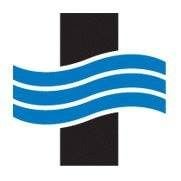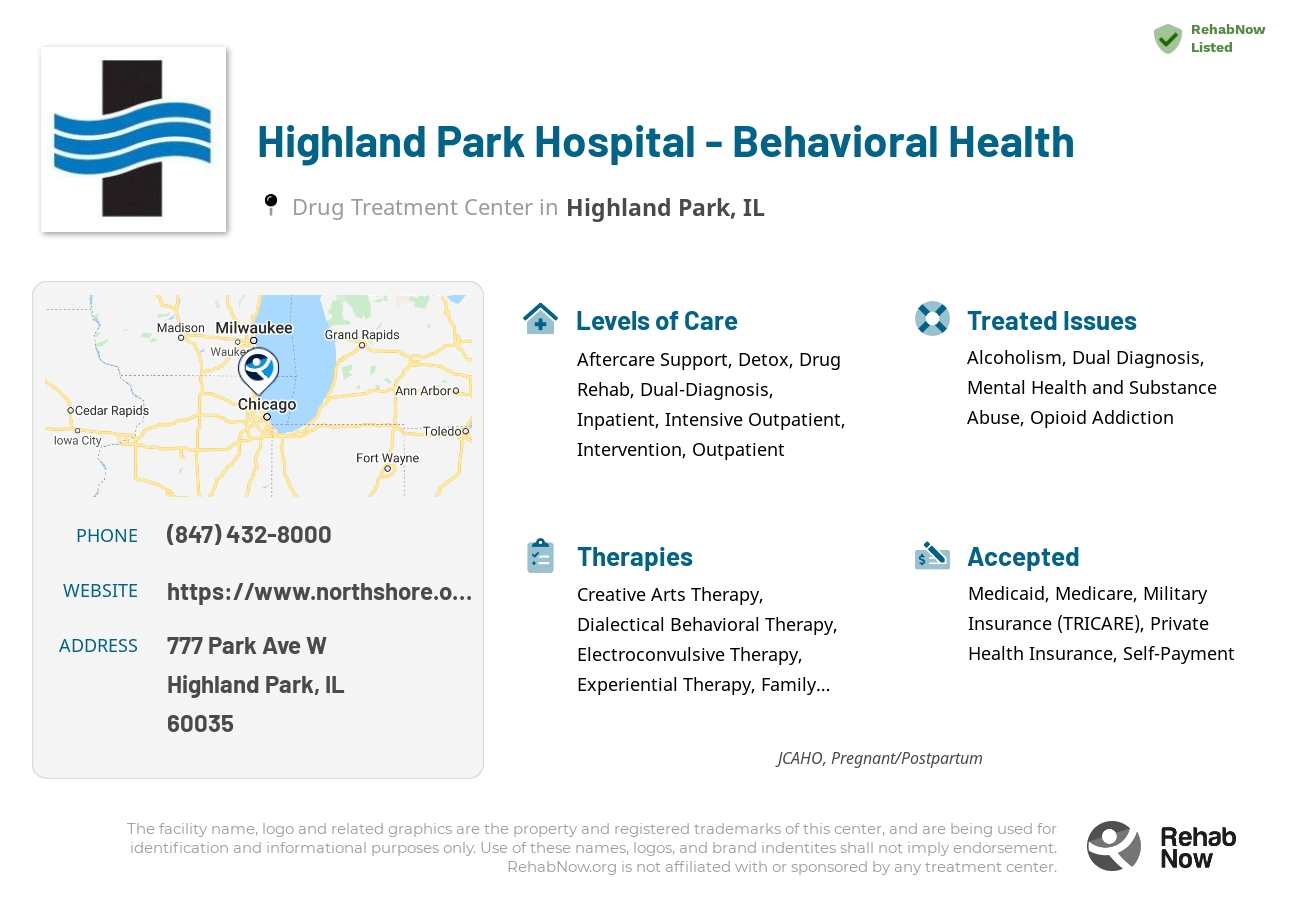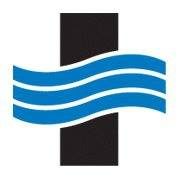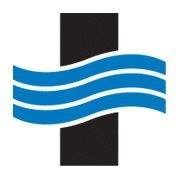Highland Park Hospital - Behavioral Health
Drug Rehab Center in Highland Park, Illinois
Highland Park Hospital - Behavioral Health is an accredited facility in Highland Park, IL, offering comprehensive treatment for addiction and dual diagnosis, utilizing full levels of care and therapeutic methods such as creative arts therapy, DBT, and trauma therapy.
About This Highland Park, IL Facility
Highland Park Hospital - Behavioral Health, located in Highland Park, IL, specializes in addressing the nuanced challenges of young adulthood through a variety of services. This 12-bed facility offers comprehensive inpatient treatment, distinguishing itself by providing age-specific programs that ensure adolescents and adults receive tailored care. Individual and group counseling, psychiatric services, and skill-building classes are among the personalized treatments available, making it a unique choice for those seeking focused support.
Accredited by The Joint Commission (JCAHO), Highland Park Hospital - Behavioral Health ensures the highest standards of care. Their affiliation with the renowned NorthShore University HealthSystem emphasizes a commitment to quality treatment within an integrated healthcare framework. Most insurance plans are accepted here, broadening access to their specialized inpatient and outpatient services for individuals battling addiction and co-occurring mental health issues.
- Offers dedicated adolescent and adult programs, ensuring tailored treatment approaches.
- Comprehensive care includes individual, group, and family counseling, alongside psychiatric care and skill-building classes.
- Accredited by JCAHO, promising adherence to high standards of care and treatment efficacy.
Highland Park Hospital - Behavioral Health addresses a range of issues including substance abuse, dual diagnosis, mental health concerns, and emotional difficulties. Treatment methods encompass detoxification, intensive outpatient programs, psychoeducational classes, and aftercare support, offering a broad spectrum of care levels to foster recovery and long-term sobriety.
Genders
Ages
Modality
Additional
Accreditations

JCAHO
Conditions and Issues Treated
Opioid addiction treatment facilities like Highland Park Hospital - Behavioral Health support people struggling with opioid dependency, which covers illegal and prescription opioids. People often abuse prescription opioids to get high instead of adhering to a medical provider’s directions. Addiction forces people to crave for opioids impulsively without factoring in the dangers these drugs bring to them.
Most opioid addiction treatment plans include detoxification and subsequent medications to ease the process. However, that’s only the beginning. Behavioral therapies and counseling are also necessary to resolve the root cause of addiction. This overall approach decreases the likelihood of falling off the wagon. In some instances, therapies can be done at home.
An underlying cause often brings about addiction. Mental disorders can lie at the center, such as schizophrenia, bipolar disorder or anxiety disorder. As well as the cause of the addiction, a dual diagnosis by Highland Park Hospital - Behavioral Health helps to treat the addiction. This ensures that after treatment is complete, the patient will not fall back on old practices.
Levels of Care Offered
This center offers a variety of custom treatment tailored to individual recovery. Currently available are Aftercare Support, Detox, Drug Rehab, Dual-Diagnosis, Inpatient, Intensive Outpatient, Intervention, Outpatient, with additional therapies available as listed below.
Detoxification is the first step in drug addiction treatment. A controlled environment where symptoms can be managed with medication and close observation is provided by drug detoxification. Detoxification is an essential step in the recovery process, but it is also one of the most dangerous. Due to the potential danger, it’s critical to understand what detoxification is and how to complete it safely.
Detoxification usually includes:
- Medical supervision.
- Medication to ease withdrawal symptoms.
- Drug testing to track progress.
- Counseling.
Inpatient treatment for addiction is generally not as scary as it might sound. It is a way to find recovery while being in a supportive and controlled environment. The duration of treatment at Highland Park Hospital - Behavioral Health in Highland Park can be different based on each individual. Many can leave after 28 days; some may stay a few months, and others may stay six months or longer.
Highland Park Hospital - Behavioral Health offers an Intensive Outpatient Program is for those who need intensive care but prefer to spend the majority of their time in the comfort of their own home. The rehabilitation services differ in length and intensity. They are customized to meet the needs of the patient.
When remaining at their job in Highland Park, or continuing their studies, the individual may live with their family while utilizing Highland Park Hospital - Behavioral Health‘s outpatient services. Treatment requires counseling the patient at the individual level, in a group setting, about substance addiction, drugs, and therapy sessions.
Typically, people engaged in drug addiction are in a state of denial about the adverse consequences of their altered behavior. They feel that on their own, they can conquer the addiction. Intervention programs in Illinois manged by Highland Park Hospital - Behavioral Health allow family members to encourage the person affected to seek external assistance.
Help with aftercare applies to the follow-up care provided after the initial recovery program offered by Highland Park Hospital - Behavioral Health in Highland Park, IL. The level of support for aftercare plays a vital role in avoiding relapse and in maintaining sobriety. Aftercare support is tailored according to the patient’s needs.
Highland Park Hospital - Behavioral Health‘s Therapies & Programs
Patients who receive generous support from their loved ones have better chances of completing their recovery. Genetics play a role when it comes to addiction, so it’s better to approach the problem as a unit. Family members can help an individual avoid addiction triggers and guide him or her in making lifestyle changes.
Group therapy is a type of counseling at Highland Park Hospital - Behavioral Health in Highland Park, IL that occurs between a bunch of strangers. The goal of group therapy sessions is to foster hope and a sense of belonging. It also helps to have people who can relate to what you’re going through. Good behaviors can also be contagious.
As a means of managing pain that has plagued them in the past, many individuals turn to drugs and alcohol. Assault, negligence, the loss of a loved one, and other unfortunate events may involve trauma. This treatment, offered and administrated by Highland Park Hospital - Behavioral Health in Highland Park, IL provides individuals the resources to cope with past traumas healthily.
Dialectical behavioral therapy focuses on eliminating negative thoughts such as suicidal thoughts. It is useful in the treatment of patients with uncontrollable emotions. The term “dialectic” means the integration of opposites. In the substance abuse context, DBT refers to accepting the patient’s addiction.
Life skills training helps the recovering person gain the skills and confidence necessary to function well in the world. Life skills training focuses on practical activities like cooking, job seeking, social interactions, and money management. This kind of training at Highland Park Hospital - Behavioral Health helps fill in the gaps caused by addiction with useful, immediately usable skills.
Nutrition Therapy focuses on improving the emotional and physical health by diet, or Medical Nutrition Therapy (MNT). A diet low in certain nutrients can contribute to feelings that can trigger addiction or relapse. To cure the body and discourage addictive behavior, diet therapy encourages healthy eating.
Patient Experience
Creative Arts
In creative art therapy, the therapist encourages the patients to express themselves through activities like sketching, painting, sculpting, coloring, collaging. The therapy helps patients to handle stress and anxiety in a better manner. It improves their communication skills and ability to process past traumatic events.
Experiential Therapy at Highland Park Hospital - Behavioral Health
Experiential therapy involves having patients work through mental issues by engaging in real time activities. It moves away from traditional talk therapy having patients role play or use props to explore their issues and emotions. This treatment process, available at Highland Park Hospital - Behavioral Health, helps people process trauma and emotion in a healthier fashion eliminating the need to turn to drugs and alcohol.
Payment Options Accepted
For specific insurance or payment methods please contact us.
Is your insurance accepted?
Ask an expert, call (888) 674-0062
NorthShore University HealthSystem Associated Centers
Discover treatment facilities under the same provider.
- NorthShore Deerfield Behavioral Health Center in Lake Forest, IL
- Evanston Hospital - Doreen E. Chapman Center in Evanston, IL
- Glenbrook Hospital in Glenview, IL
Learn More About NorthShore University HealthSystem Centers
Additional Details
Specifics, location, and helpful extra information.
Highland Park, Illinois 60035 Phone Number(847) 432-8000 Meta DetailsUpdated April 15, 2024
Staff Verified
Patient Reviews
There are no reviews yet. Be the first one to write one.
Highland Park, Illinois Addiction Information
In 2016, more than 2,350 Illinoisans died from drug overdoses. More than 5,500 deaths annually occur in Illinois due to the abuse of alcohol and other drugs. 7.17% of Illinois residents reported using illicit drugs in the past month (2018). Substance abuse costs the state approximately $3.5 billion every year.
Alcohol is involved in nearly half of all fatal accidents in Highland Park, IL. Marijuana often serves as a gateway drug to harder substances. The rates of use of marijuana among high school students increased by 20% between 2018 and 2019. 11.5% of alcoholics in Highland Park also abuse drugs. Common treatments include inpatient and outpatient treatment, 12-step programs, detoxification, and alternative treatment.
Treatment in Nearby Cities
- Highland Park, IL (0.7 mi.)
- Westmont, IL (28.6 mi.)
- Carlyle, IL (261.0 mi.)
- Golconda, IL (335.5 mi.)
- Newton, IL (222.1 mi.)
Centers near Highland Park Hospital - Behavioral Health
The facility name, logo and brand are the property and registered trademarks of Highland Park Hospital - Behavioral Health, and are being used for identification and informational purposes only. Use of these names, logos and brands shall not imply endorsement. RehabNow.org is not affiliated with or sponsored by Highland Park Hospital - Behavioral Health.







